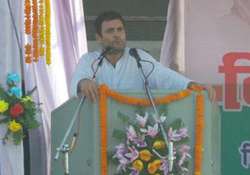Rahul Gandhi dismisses PM's remarks in the light of Dadri incident
Mandya (Karnataka): Congress Vice President Rahul Gandhi today dismissed Prime Minister's remarks on the Dadri lynching incident, while accusing Modi and BJP of "polarising the country" and having a "strategy" to make Hindus and Muslims

Mandya (Karnataka): Congress Vice President Rahul Gandhi today dismissed Prime Minister's remarks on the Dadri lynching incident, while accusing Modi and BJP of "polarising the country" and having a "strategy" to make Hindus and Muslims fight with each other.
Reacting to Modi's first comments amid communal overtones in the wake of the lynching incident in Uttar Pradesh, where he pitched for communal harmony and brotherhood in the country, Rahul said, "It is nice for the Prime Minister to make such comments. But the Prime Minister has a history and the Prime Minister has a party that is behaving in a completely different way which he doesn't seem to want to stop."
Talking to reporters after visiting the families of farmers who committed suicide in this district, the leader said, "The BJP and the Prime Minister have a strategy of polarising this country. They have a strategy of making Hindus and Muslims fight with each other.
"That you can see in every election. There is a polarisation taking place. Riots are taking place. There were BJP people involved in the Dadri incident," he said.
Gandhi's remarks came in response to a question about the comments by the Prime Minister who broke his silence at an election rally in Bihar yesterday amidst the raging row over the Dadri lynching incident, wherein a 50-year-old man was lynched in Dadri over rumors of consuming beef.
In his speech, Modi had said Hindus and Muslims should decide whether to "fight each other" or "together" to overcome poverty while asking the people to ignore "irresponsible" statements of politicians.
"The country has to stay united," Modi had asserted while he invoked President Pranab Mukherjee who underlined the need to maintain India's core values of diversity, tolerance and plurality.